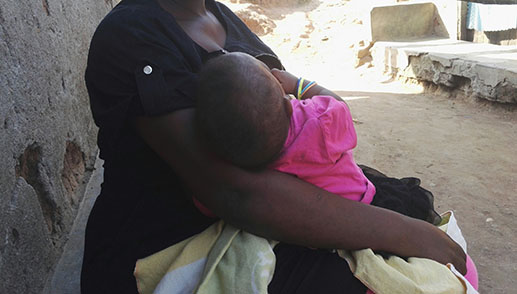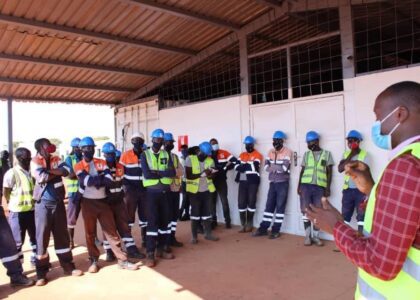In Uganda, the biggest population is employed in Urban and Peri-urban communities. This also comprises of women majority living in Kampala slums as casual labourers in the informal sector mainly due to low education levels. Because the informal sector is not regulated by authorities, employees work under inhumane, unlawful, unprotected and exploitative working conditions. However, majority of employees tolerate such conditions because of high unemployment rates and household poverty levels.
The tolerance of injustices at work is grossly affecting the lives of the citizenry and relegating them to destitution. One of them is Gladys, a resident of Kivulu Slum, a Kampala suburb, who is a former casual labourer at one of the education institutes.
I worked as a cleaner with other people. All the classrooms and offices were expected to be clean by 8:00am. This meant that I had to wake up at 5:00am every day to prepare my children for school before going for work ,
Gladys recalls
She never minded waking up very early in the morning because she lived nearer her workplace. She narrates her ordeal while struggling to hold back tears that flow down her cheeks. At that time, she was expecting her third child. Much as her family was happy about the development, not all was good. Her Job was at stake. From stories she had heard from colleagues; when one became pregnant, chances of losing their job were high, yet chances of finding another after birth were minimal.
Few months into pregnancy, my ability to work faster, lift heavy items and bending down to touch the floor was reducing. My supervisor had noticed it. Like any other person afraid to lose their job, I persisted and pushed the heavy and tired body to work every day. At six months of pregnancy, I started experiencing back pain. On one of my antenatal care visits, the doctor advised that I stop working and have total rest until I gave birth,
she recalls.
Grace is another mother who has faced the wrath of Uganda’s harsh working conditions in the informal sector. While working as a field supervisor, Grace chose to forego legal entitlement of three months’ maternity leave because she feared that her bosses would not renew her contract when she leaves work for the 90 days of maternity leave.
It was only one workmate who worked in the neighboring field who knew about my pregnancy. She covered for me for two weeks after giving birth and I had to resume work immediately much as it put my health and that of the baby at risk. Maternity leave at my workplace is unheard of, Grace recalls.
These stories and other unreported ones clearly point to the social protection, gender inequality and inequity issues in employment that have largely been ignored. Stories abound of women who have lost their jobs because of things like pregnancy and getting married. This is unfair and illegal. Both the Constitution of Uganda and the Employment Act 2016 provide for rest from work and a fully paid maternity leave as a legal entitlement of every expecting mother.
Fortunately, Uganda has put forward a number of strategies and polices that prioritize social protection. The National Social Protection Policy by Ministry of Gender Labor and Social development 2015 with its slogan ” income security and dignified lives for all ” is one of the recent efforts put in place to ensure that there is social protection for the less advantaged people.
National Social Security Fund (NSSF), a quasi-government fund that is required by all employees in the private sector is hugely not considered by employers for their causal labors. It is stated in the NSSF Act, Cap 222 (laws) of Uganda that the fund will provide social security services to employees in Uganda. Everyone employed under contract of service is required to have a 5% deduction from his/her monthly gross pay and entitled to a 10% contribution from employers to pay for NSSF. However, the fund is making inroads in the informal sector.
However, even with the development of a fairly robust legal and policy framework to protect employees at work places, women still face unjust, unequal and unequitable chances in the employment sector. This has relegated most of them to destitution and at the mercy of their male counterparts which leaves them highly prone to further violations.
85 % of casual labors are normally contracted, if at all, on short term of 3 – 6 months and the renewal of such contracts is normally at the mercy of the employer. This injustice means the redress mechanism upon termination is unavailable since one’s contract is already expired. Consequently, many women like Grace and Gladys have fallen victim to this impunity, which majorly happens during maternity rest, or during sick leaves which most expecting mothers need during these fragile pregnancy periods.
Yet with such injustice, Uganda’s quest to attain middle income status by 2020 and also promote prosperity may remain a farfetched dream.
Joy for children Uganda (JFCU), an organization working with women living in slum communities of Kampala has conducted various information empowerment meetings on gender and gender equality. The organization has made various recommendations in the employment sector including the regularization of the exploitative informal sector which employs over 60% of Ugandan workers. These meetings have fundamentally equipped women in slums with vital information so that they become change agents/ advocates for improved working conditions at work places.
To boast the incomes of vulnerable women in slums, Joy for Children Uganda also supports skills training and has set up local community monetary groups for women to provide access to soft loans with minimal interest rates. The overarching objective of this initiative is to accelerate economic empowerment for women in Kampala slums like Gladys and Grace who, cannot find an alternative means of livelihood or find a suitable job.
The author dedicates this article to every woman who cannot enjoy the otherwise would be exciting news of having a baby because pregnancy comes with a dilemma of losing her job, Just like Gladys.







